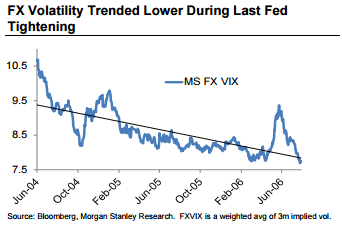The Fed said its dovish word, but this implies trouble also for other central banks.
And what does it mean for volatility? The team at Morgan Stanley weighs in:
Here is their view, courtesy of eFXnews:
Right up to this week’s FOMC rate decision, the markets remained uncertain about the outcome.
“Largely due to international developments, the Fed decided to pass on hiking for now, and once they do move, the Fed is expected to tighten only very slowly and cautiousl , ending at a terminal rate lower than previous cycles,” says Morgan Stanley.
Does this suggest that the USD uptrend is complete? Morgan Stanley thinks not.
“Due to the uneven nature of the global recovery post financial crisis, monetary policy is not as synchronized as it once was. As a result, the Fed will be hiking rates in an environment where we forecast close to 60% of the central banks under our coverage to either maintain or cut rates further until the end of 2016. As such, the differential should continue to grow more USD supportive over the course of the next year,” MS projects.
“Note that rate differentials matter for international investors not in isolation, but rather on a risk-adjusted basis. And with the numerator only likely to change marginally compared to past cycles, having a view on the denominator – FX volatility – we think is just as important in assessing whether high carry strategies which flourished in the past Fed tightening cycle will return to vogue,” MS adds.
In that regard, MS sees three reasons why FX volatility will be higher this tightening cycle than in the last one.
“First, the Fed’s data-dependent approach is a break from the Greenspan-era ‘measured pace.’ This raises uncertainty on the future Fed Funds rate, the world’s monetary anchor and liability currency for private sector investment.
Second, slower reserve accumulation may increase volatility via (a) reduced presence of an ‘automatic’ buyer of Treasuries and (b) less reserve rebalancing to cushion FX moves.
Third, reduced fixed income balance sheets are likely having a negative impact on liquidity and contributing to sharp increases in asset market volatility, including FX,” MS clarifies.
For lots more FX trades from major banks, sign up to eFXplus
By signing up to eFXplus via the link above, you are directly supporting Forex Crunch.

